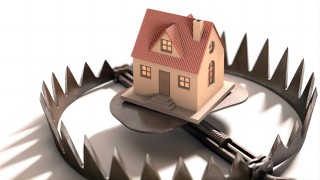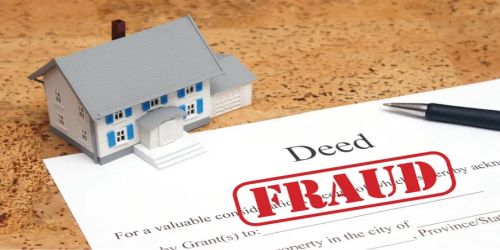
Unmasking Real Estate Fraud: Types and Solutions!
Advertisement
Real estate fraud refers to deceptive practices in the property market aimed at deceiving buyers, sellers, or investors for financial gain. Scammers exploit vulnerabilities in real estate transactions, leading to significant financial losses and legal complications for the victims.
1.Mortgage Fraud: In this scheme, fraudsters provide false information or use identity theft to secure mortgages they have no intention of repaying. This can result in financial losses for lenders and may leave innocent homeowners facing foreclosure.
2.Title Fraud: Title fraud involves criminals using stolen identities to transfer property titles to their name, allowing them to sell or mortgage the property without the owner's knowledge. Victims may only realize the fraud when they face legal repercussions or property disputes.

3.Foreclosure Scams: Scammers prey on vulnerable homeowners facing foreclosure by offering to "rescue" them from the situation for a fee. They may promise loan modifications or assistance with avoiding foreclosure, but in reality, they exploit the distressed homeowners' situation and pocket the money without delivering the promised help.
4.Rental Scams: In rental scams, criminals impersonate property owners or landlords to collect deposits or rent payments for properties they do not own. Prospective tenants may be left without a place to live and lose their money in the process.
5.Investment Schemes: Fraudulent investment schemes lure unsuspecting investors with promises of high returns from real estate ventures. These scams often rely on false information, unrealistic projections, or Ponzi-style structures, resulting in investors losing their money.

How to Solve Real Estate Scams When You Encounter Them:
a) Verify Information: Before engaging in any real estate transaction, verify the identity and credentials of all parties involved. Conduct thorough research on the property, ownership history, and any related legal documents.
b) Use Reputable Professionals: Work with trusted real estate agents, attorneys, and lenders who have a proven track record of successful transactions. Seek recommendations from reliable sources to ensure you are dealing with reputable professionals.

c) Inspect the Property: If you're purchasing or renting a property, physically inspect it before making any financial commitments. Be cautious of deals that rely solely on online interactions and refrain from sending money without seeing the property in person.
d) Be Wary of High-Pressure Tactics: Scammers often use high-pressure tactics to rush you into making quick decisions. Take your time to evaluate the situation carefully and walk away if anything feels suspicious.
e) Report Suspected Scams: If you encounter or suspect a real estate scam, report it to the appropriate authorities immediately. This can help prevent others from falling victim to the same fraudsters.

In conclusion, real estate fraud poses significant risks to buyers, sellers, and investors. Understanding the common types of scams and taking preventive measures can help you safeguard your interests and financial well-being. By verifying information, using reputable professionals, and being cautious in your transactions, you can protect yourself from falling victim to real estate scams. If you encounter suspicious activity, don't hesitate to report it to authorities to ensure a safer and more secure real estate market for everyone.
Advertisement
Advertisement
- Previous article
- Exploring the Best Home Decorating Loans: Elevate Your Space with Financial Ease!
- Next article
- The Power of Loans: Empowering Your Financial Journey
Advertisement
OTHER NEWS

What you Need to do to buy Auto Insurance?
BY Wendy

How Much do you Know About the Hidden Costs of Buying a Home in the US, Apart From the Down Payment and Mortgage?
BY Anna

How to Choose The Right Insurance for You
BY Little Crystal

How to Avoid Being Scammed by Credit Card Fraud!
BY Wendy

Understanding Survivorship Life Insurance: Planning for the Future Together!
BY Wendy

How to buy the Right Insurance for you!
BY Little Grapes
RECENT NEWS
-

Demystifying Bitcoin
-

Securing and Maintaining High Limit Credit Cards: A Comprehensive Guide!
-

The investment value of men’s watches
-

Guarding Against Credit Card Fraud: What to Do If Your Identity Is Compromised?
-

Strategies for Success in the Watch Industry
-

Understanding Survivorship Life Insurance: Planning for the Future Together!
 0
0 0
0